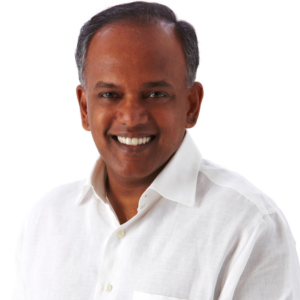Examining the fine line between public scrutiny and personal privacy in political life.
SINGAPORE – Law and Home Affairs Minister K. Shanmugam quickly stepped up to the microphone as the Minister for Culture, Community and Youth, Edwin Tong, concluded his clarification about the Singapore Land Authority’s procedures for improvement works. It was Deputy Speaker Christopher De Souza’s turn to give the floor to NCMP Hazel Poa, but Shanmugam insisted on responding to a question about how the Singapore Land Authority (SLA) “scopes and awards contracts to different entities.”
The recent public scrutiny surrounding the black-and-white bungalows at 26 and 31 Ridout Road, currently rented by Shanmugam and Foreign Minister Vivian Balakrishnan, triggered the exchange. The controversy began when opposition politician Kenneth Jeyaretnam alleged that leasing these state-owned properties to politicians could create a conflict of interest. Both ministers were cleared of wrongdoing after an investigation, but Jeyaretnam continued to stir the pot, speculating without evidence that Minister Shanmugam’s home improvements were linked to his son’s company, Livspace, a design and renovation firm.
Shanmugam vehemently denied these claims, stating, “If you want to come after me, you come after me. I am perfectly capable of defending myself. But leave my family alone.” Minister for Manpower Tan See Leng nodded in agreement, and Parliament remained stoic.
However, the scrutiny raised questions beyond operational matters; it was also about the optics of a public official residing in a large private property, which contrasted with the common citizen’s lifestyle. While Shanmugam had previously lived in a Good Class Bungalow (GCB) in Astrid Hill without drawing public ire, his current residence at Ridout Road faced far more criticism. Shanmugam responded by reiterating his commitment to serving Singaporeans from all walks of life, stressing that no one questioned his empathy or ability to serve during his years in Astrid Hill.
While both Astrid Hill and Ridout Road involve the topic of property, the concerns surrounding the latter were rooted in perceived conflicts of interest. Public concerns arose not just over the size of the property but over whether the ministers might have used their political influence to gain special privileges, especially in a country where integrity is highly valued. In a political environment where corruption is a sensitive issue, such allegations invite closer inspection.
However, the question arises: What should remain private for public figures, and what should be disclosed? Context plays a crucial role. Public scrutiny of the ministers’ private lives has brought attention to the issue of transparency. As Minister Balakrishnan shared, his interview with the Corrupt Practices Investigation Bureau was invasive and thorough, reflecting the deep dive into ministers’ personal affairs.
The key question remains whether personal details, such as the ministers’ property arrangements, are crucial for the public to know. While some information can reveal important insights into a public official’s character, excessive prying into their private lives can cross boundaries. Shanmugam and Balakrishnan both had to share aspects of their personal lives, not by choice, but because the political conversation demanded it. Minister Shanmugam shared his journey from a rental flat to a GCB, while Minister Balakrishnan explained his family’s needs.
Yet, the public’s right to know should not be abused. While certain details may shed light on a public official’s character, baseless speculation, like Jeyaretnam’s unfounded connection between Shanmugam’s home improvements and Livspace, adds little value to the discussion. Such unfounded claims only foster a culture of voyeurism, distracting from legitimate political discourse.
Despite the unwelcome spotlight, there are some benefits to the situation. It has sparked a wider conversation about conflicts of interest, and Prime Minister Lee Hsien Loong announced a review of declarations of property transactions by public figures. This review will help strengthen the public’s trust in its leaders by ensuring stricter checks on property dealings.
In the end, when does a minister’s private life become relevant to the public? The answer lies in whether such information helps the public understand the minister’s role in governance or enhances the functioning of the public system. In cases where potential conflicts of interest arise, such as the Ridout Road properties, the public’s curiosity might be justified.








